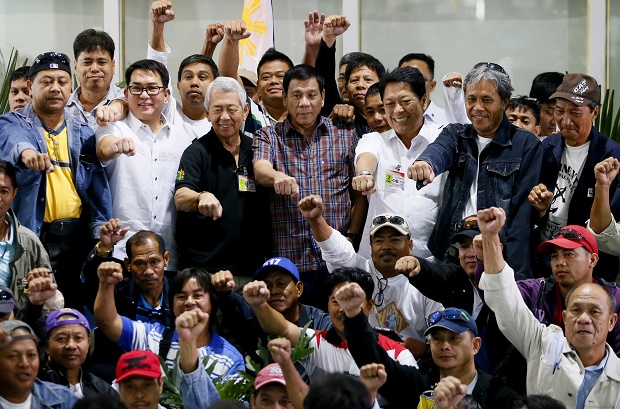Hope for OFWs as Saudi vows to pay private firms

President Rodrigo Duterte gestures with a fist bump as he poses with overseas Filipino workers upon their arrival at the Ninoy Aquino International Airport on Aug. 31, 2016. The Filipino workers were repatriated back to the country after fleeing from their jobs in the Middle East and sought shelter refuge at the Philippine Embassy in Saudi Arabia. AP
RIYADH, Saudi Arabia — Saudi Arabia will pay by next month the money it owes private companies after oil revenues collapsed, a committee headed by powerful Deputy Crown Prince Mohammed bin Salman said Monday.
The arrears have left tens of thousands of foreign workers, including thousands of Filipinos, struggling for months while they await back wages.
In July, as many as 11,000 retrenched Filipino workers were stranded in Saudi, a migrant workers’ group said.
READ: PH sends team to rescue OFWs stranded in Saudi | Owwa gives P135-M aid to stranded OFWs in Saudi
“The council came up with a package of solutions and procedures to settle the dues that met the requirements of spending,” the official Saudi Press Agency reported after a regular meeting of the Council of Economic Affairs and Development.
Solutions “will be implemented immediately and completed before December 2016”, it said, in a rare discussion of the delayed payments.
The council discussed “the necessary procedures to pay the amounts owed to the private sector from the public treasury,” SPA said.
“The payment was late due to the sharp decline in oil revenue and the measures taken by the kingdom to reduce spending on a number of projects.”
“The payment was late due to the sharp decline in oil revenue and the measures taken by the kingdom to reduce spending on a number of projects.”
SPA added that priorities were rearranged according “to impact and efficiency”, but there had been “obstacles to implement the procedures”.
Since 2014, global oil prices have collapsed by about half, accelerating Saudi efforts to move away from petroleum which still accounts for the bulk of government income.
In April, Prince Mohammed announced a wide-ranging plan for economic diversification and social change in the coming years.
The world’s biggest oil exporter is projecting a budget deficit of $87 billion in 2016.
It has taken a series of austerity measures, including subsidy cuts, reductions in cabinet ministers’ salaries and delays in major projects.
It has taken a series of austerity measures, including subsidy cuts, reductions in cabinet ministers’ salaries and delays in major projects.
According to SPA, billions of dollars have been saved by rescheduling and modifying contracts, while “a large number” of projects were stopped, saving tens of billions more.
Early last month the construction giant Saudi Binladin Group said the government had transferred “some payment” in the previous two weeks, allowing it to cover some back wages to its remaining staff.
The company had already finished payments to around 70,000 laid-off workers.
Tens of thousands of employees of another construction firm, Saudi Oger, have gone unpaid for months. The company is led by Lebanon’s newly nominated premier, Saad Hariri.
Agence France-Presse